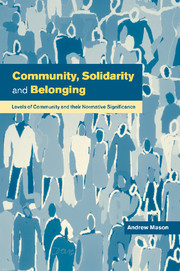Introduction
Published online by Cambridge University Press: 22 September 2009
Summary
‘Community’ is a term used with alarming frequency. People talk of international community, which some think has been made possible by the end of the Cold War; of national community, which politicians often promise to rebuild in the face of increasing crime and lawlessness or in reaction to the fear that it is being eroded by immigration; of the local or neighbourhood communities which are sometimes said to be threatened by gentrification or (like London's Docklands) redevelopment. Some also speak of the business community's attitude towards a rise in interest rates, or the gay community's support for legislation which equalized the age of consent for heterosexuals and homosexuals. Faced with this array of putative communities, it is hard not to become suspicious that the term is being used unreflectively, or that it is being used purely emotively, to induce support for social arrangements or policies which the speaker or writer happens to favour.
There is, no doubt, something in these suspicions. But they should not prejudice attempts to sort out from the mire of ordinary usage a coherent concept (or set of concepts) which may help to illuminate our linguistic practices and the nature of our social lives. If ordinary usage is to be trusted at all, it would appear that communities can be of different kinds. For instance, there may be religious communities, ethnic communities, national communities, moral communities or linguistic communities. Not only can communities be of different kinds they may also exist at different levels.
- Type
- Chapter
- Information
- Community, Solidarity and BelongingLevels of Community and their Normative Significance, pp. 1 - 14Publisher: Cambridge University PressPrint publication year: 2000
- 6
- Cited by



